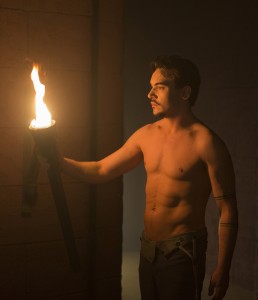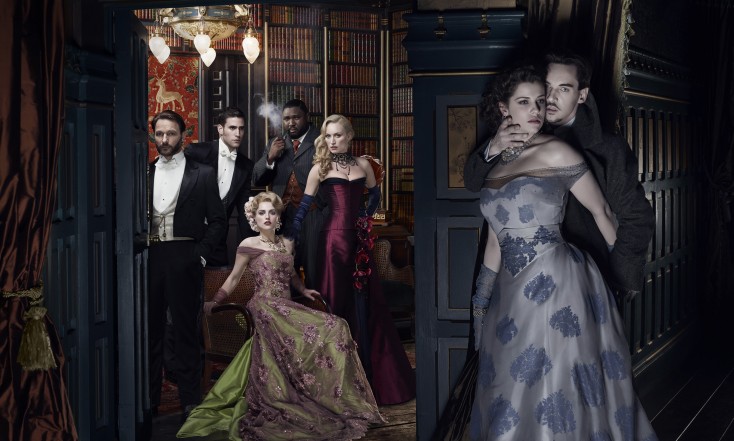
Jonathan Rhys Meyers as Alexander Grayson in the NBC series “DRACUL A.” ©NBCUNIVERSAL MEDIA. CR: Jonathan Hession.
By ANGELA DAWSON
Front Row Features
HOLLYWOOD—Let me start with a disclaimer: I’ve known Cole Haddon, the creator and co-executive producer of the new NBC series “Dracula,” premiering at 10 p.m./9 Central Friday, Oct. 25, for many years.
I sat with him at roundtables and press conferences at various film junkets. A fellow entertainment journalist, he always asked unexpected, pertinent and insightful questions of the various filmmakers and talent we interviewed. I knew he wanted to be a screenwriter, but I had no idea of the extent his imagination.
A gracious and humble person, he didn’t brag of his achievements, such as the graphic novel he published a year ago through Dark Horse Comics called “The Strange Case of Mr. Hyde,” which is now in development as a film project.
So it was with great delight that I had the opportunity to speak with him about his “Dracula” series, starring Jonathan Rhys Meyers of “The Tudors” fame.
Set in the 1890s, this sexy new horror drama is likely to shake up network television. Haddon’s take on the iconic vampire is based on historic and controversial elements from history: the Knights Templar, the real inspiration for Dracula (Vlad Tepes a.k.a. Vlad the Impaler), Darwinism and the Industrial Age. It also addresses social and environmental issues relevant today such as fossil fuel vs. renewable energy.
Dublin-born Rhys Meyers plays American industrialist Alexander Grayson, who arrives in London in the 1890s to quash the efforts of a handful of wealthy individuals who are stoking a war in the Middle East so they can lay claim to the region’s rich oil fields. In Haddon’s pilot episode, Grayson offers another idea that doesn’t sit well with these profit-minded individuals: wireless electricity.
Accompanied by his manservant Renfield (played by “Games of Thrones’” Nonso Anozie) Grayson/Dracula must stay a step ahead of his enemies, who are members of a secret sect that was responsible for the murder of his beloved wife five hundred years earlier. As he plots his revenge against them, complications ensue when he falls in love with a woman (Jessica De Gouw) that is a dead ringer for his late wife.
Like so many would-be Hollywood writers, Haddon, 37, arrived in Tinseltown from somewhere else. In his case, it was Ann Arbor, Mich., where he had graduated from the University of Michigan. A true cinephile—he has watched a lot of weird and rare films that most people have never heard of—he toiled for four years as a freelance film reporter while deciphering how to break into the Hollywood system. Soon he was writing film criticism for 20 newspapers around the country. But what he really wanted to do was to create, not simply comment on other people’s work.
When he got the call from his manager that his “Dracula” pitch was accepted at the Peacock network, Haddon was just days away from his wedding. It couldn’t have come at a better time as the struggling writer was running out of money … and hope. Within a week’s time, he sold a movie screenplay to Warner Bros, which now is in development.
Having written the pilot for “Dracula,” Haddon hired and worked with a group of veteran Hollywood TV writers, including “Twin Peaks’” Harley Peyton and Daniel Knauf (“Carnivale”) on the other nine episodes that NBC Entertainment has ordered. He serves as co-executive producer on the show.
Q: Did you think of the visual look when you were writing the pilot?
Haddon: From the start, it was my vision it would have that Baz Luhrmann/Sofia Coppola anachronistic touch. It seemed necessary to have a slightly more stylized version of our world. That may come from my love of (horror-centric British production company) Hammer films, where everything is just slightly over-the-top and the colors just slightly more dramatic and where the blood is much brighter than real blood. From the costume design to the production design, it always was my hope that it would turn out this way, and in the end it’s 90 percent of what I hoped to see on screen, which is a pretty impressive ratio for a two-years later result.
Q: Did your love of comic books and graphic novels shape your idea for this?
Haddon: When I started screenwriting, it wasn’t as a trained screenwriter. In some ways that’s helpful. I approach it from a place of language. For me, it was a place where there were no rules. That’s what comic books gave me. Also, my love of old B-films (influenced it) as well as some obscure horror films from the ‘50s, ‘60s and ‘70s. For better or worse, my approach to the pilot was one of ignorance of how it should be done. I just approached it from how I wanted it to be done. So the original pilot script had iris-outs, which are small nods to films of the 1910s and more. So there are all sorts of visual references, including (1960’s horror movie)“Black Sunday,” and those sorts of things. It was really just taking my love of comic books and bizarre cinema and assembling it in some way that seemed entertaining to the masses. Luckily, (NBC executives) agreed.
Q: How has the collaborative process of making a TV show been for you?
Haddon: I have a passion for science, so the philosophical problems that come up in the show between faith and science and to see my Darwin lines survive in a network show is satisfying. I would have thought they would cut out all that stuff.
Q: Do we need another “Dracula?” What makes your version different?
Haddon: I’m not sure the world needs another version of “Dracula.” It was my initial hesitation when the idea of resurrecting the character was brought up to me, because he’s been so abused by pop culture for years on end. Other than the Francis Ford Coppola version, I don’t think I’ve seen any other version of Dracula in the past 30 years that I could even tolerate. Looking at a character that had been abused, even in its original form, I saw that it had lost his relevance. I had to dig into the actual inspiration for the character, which was Vlad Tepes, who turned out to be a fascinating character. Other than just being an insane madman who probably killed hundreds of thousands of people for entertainment, he was this Renaissance man in so many ways. He was a member of this Templar Knights organization called the Order of Dragon, where the title “Dracula” comes from. It means son of the dragon. They were these fundamentalist nut jobs, who were trying to spread Christianity through a holy war across Europe through secretive means. So the idea that this very secular-minded figure wanted to bring the Renaissance and reason to Eastern Europe, he’d be using these people for his own aggrandizement and empowerment, was interesting. The idea that they would punish him (inspired) the germ of the show: the fundamentalist order curses this man to suffer as “the dark one” and give him accidentally all the powers that would make him their greatest enemy. From there it was extrapolated to this monster, born of supernatural origins, who wants to do everything he can to destroy an organization built upon fundamentalist religious extremists. The idea of faith versus reason set during the 1890s, when the industrial world was really in competition with antiquated ideas—it seemed like a point in history where people really struggled to figure out what we were going to be as a species. For (Dracula) to return as a scientific messiah of sorts against this Order was what was relevant to me. It seemed appropriate to today’s issues.
Q: Are you surprised NBC was open to your idea to go back to the source material as opposed to making another “Once Upon a Time” or “Buffy the Vampire Slayer?”
Haddon: It stunned me but I think it’s a tribute to (NBC Entertainment chairman) Bob Greenblatt’s vision for the network. He came from Showtime, and really wanted to bring the (forward-thinking) cable experience to network TV. When I first discussing this with NBC, I was enthusiastic about having the job but I also was afraid of what could happen to the ideas I was bringing to the table, like how I want to talk about Darwin in every episode and have all these references to all these scientific geniuses, and the bad guys are fundamentalist Christians. (But) from the start, they embraced our ideas and told us to run with it. They never told us not to anything other than show a little less ***.
Q: How important was it to get Jonathan Rhys Meyers as Dracula/Vlad/Alexander Grayson?
Haddon: It’s funny how Johnny came to the project because when we originally sold it he wasn’t involved. When I would go into development meetings and explained the show, somehow it became normal to speak about Johnny like he was Dracula. Nobody said we’d like to get Johnny for this part. We knew Bob Greenblatt and his people were fans of his. I would say, “this is the scene where Dracula walks into the steam room, because you’ve got to get Johnny’s shirt off at some point, right?” And it became so normal (to speak of him in this role) that it almost was anticlimactic when I got the call that he was going to play the part. He became a producer because he had some clear ideas on how to play character who was a human that died 500 years earlier and he has become this monster in a sociopathic way, trying to play a human being that he doesn’t really remember how to be anymore.
Q: How about the other characters?
Haddon: Van Helsing (Thomas Kretschmann) was important to me as was Renfield (Nonso Anozie). The reimagining of (Renfield, Dracula’s servant) was the most dramatic one for fans of “Dracula,” because in the novel and in most cinematic (versions), Renfield is just a psychopath eating bugs in a cell, obsessed with becoming immortal. That didn’t work in this version but the idea of a devoted manservant who took care of everything and only wanted the best for (Dracula) made sense so once we had Grayson become an American industrialist, he needed some sort of majordomo or confidante and this character. He would be attracted to someone operated on the outskirts of society so an educated black man, a lawyer, in the 1890s who, no matter what, is not going to be taken as seriously as everyone else. He seemed like the perfect counterpart to this upstart American personality, and Nonso nailed it.
Q: What’s the story arc this season?
Haddon: The arc is Dracula/Alexander Grayson’s quest to destroy the Order’s ambition to drive England to war with the Ottoman Empire and gain the old fields there, thereby insuring their financial control over the fuel source of the 20th century. He hopes to undermine that and counter it with his vision of wireless electricity and clean/renewable energy. And the complications that ensue, because this quest of his is built on vengeance against the Order of the Dragon for their execution of his beloved wife even though (SPOILER ALERT) his wife seems to have reappeared in England in a reincarnated form. It’s about what happens when the last vestige of your humanity starts to interfere with your monstrous vengeance.
Q: Do you miss entertainment journalism?
Haddon: I’m such a cinephile, I want to start writing film academia, and start doing non-fiction and go back to film criticism just for fun. As much as I don’t want to go back to being a journalist, I still want to interview people and talk about film. It’s just a lot of fun.





